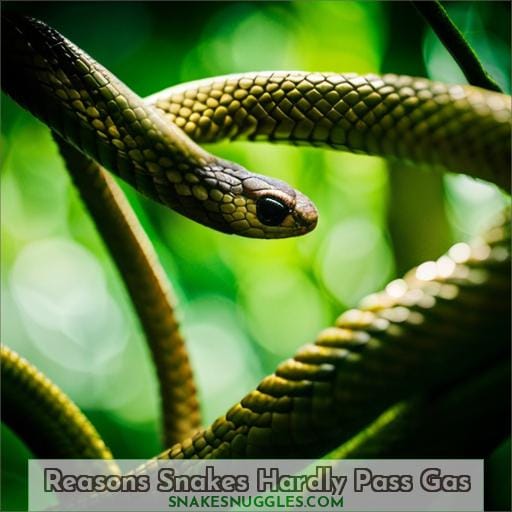This site is supported by our readers. We may earn a commission, at no cost to you, if you purchase through links.

It turns out that, while they don’t pass gas as often as we humans do, snake flatulence is actually a thing! In this article, we’ll discuss why and how snakes fart – from defensive farts to brumation-induced ones – and explain whether or not their farts smell.
We’ll also explore any health concerns associated with your pet’s flatulent tendencies so you can rest easy knowing your slithery pal is healthy and happy.
So grab some popcorn (not for the snake!) and join us on our journey into understanding reptilian ‘tooting’.
Table Of Contents
Key Takeaways
- Snakes do fart due to their unique digestive and physiological traits.
- Snake farting behavior can indicate health issues such as infection or indigestion.
- Snake farts are mainly composed of nitrogen and carbon dioxide and are usually odorless.
- Frequent or foul-smelling snake farts might suggest health problems or obstructions.
Do Snakes Fart?
You may be surprised to learn that snakes do, in fact, fart — a result of their unique digestive and physiological characteristics. Farts come from the cloaca; this dual-purpose organ is used for waste elimination and reproduction.
These farts are usually quiet and odorless due to minimal gas production but can manifest as bubbles underwater due to its double function. Such infrequent flatulence can be attributed to snake diets typically consisting of carnivorous prey which produces less gas than herbivores do.
Some species also employ it defensively by producing loud popping sounds with air expelled forcefully through the cloaca—startling potential predators away! Other possible explanations include expelling debris or cleaning out the cloaca while persistent farting could signify infection or indigestion caused by wild-caught prey ingestion which should be monitored closely by qualified herp vets along with fecal samples for parasite analysis purposes as well as maintaining proper temperature range essential for healthy digestion overall.
In addition, snakes also have other defense mechanisms such as defecating/urinating on opponents and noxious scent glands that aid in protection against threats so excessive gaseous behavior might point towards intestinal problems plus infections, obstructions or tumors requiring vet attention without delay making snake flatulence an important indicator when assessing health status despite being rarely associated with scaring off adversaries like sometimes thought about!
Why Do Snakes Fart?
You may be surprised to learn that snakes can indeed fart, and it’s actually related to their unique digestive system. Defensive farts are produced when a snake feels threatened, while during brumation, the cloaca releases air bubbles underwater for self-cleaning purposes.
Farting in snakes is, therefore, normal behavior but should still be monitored if excessive or foul-smelling.
Defensive Farting
Some species of reptiles may use their unique cloaca to produce loud popping sounds as a defense mechanism. These farts are used to startle predators and usually have an unusual odor. The frequency depends on the diet, digestion, and other health factors that could indicate infection or parasites if persistent.
Farting is also employed for expelling debris from the cloaca or cleaning it out in some cases. In any case, one should take note of snake fart behavior and potential causes while keeping up with regular vet visits for assessment purposes.
Brumation
Brumation is a state of dormancy that snakes enter into during colder months, much like humans do when we hibernate. This inactivity period helps them survive the winter and conserve energy by slowing down their metabolism.
The duration and patterns vary depending on environmental triggers such as temperature, light levels, humidity, etc.
During this dormant time frame, snake fart frequency may be reduced due to slowed digestion along with decreased odor from farts since gas production is minimal. However, if your pet snake’s flatulence persists over an extended period of time, it could indicate health issues that should be addressed by a veterinarian experienced in reptile care.
Ensuring proper Reptile Enclosure Hygiene and monitoring brumation cycles are key components for keeping your pet healthy!
Self-Cleaning
When it comes to self-care, snakes have a unique tactic: farting. A snake’s cloaca is used for both waste elimination and reproduction, which contributes to their ability to produce gaseous behavior.
This flatulence in snakes often goes unnoticed due to its odorless emissions; however, the efficiency of digestion can be determined by observing the frequency of farts released from the snake’s cloaca.
While some species use this as a defensive mechanism by producing loud popping sounds with expelled air, others rely on it for cleaning purposes or expelling debris from their gut bacteria.
Snakes may also suffer indigestion leading up to an increase in flatulence; monitoring these episodes is essential for understanding any underlying issues and maintaining overall health among reptilian populations worldwide.
Do Snake Farts Smell?
You may be wondering if snake farts smell, considering their dietary habits and unique digestive system. Fortunately, most snakes emit odorless emissions due to their carnivorous diet and reptile digestive system.
The composition of a snake’s fart is greatly affected by the type of food they consume as well as gastrointestinal bacteria present in their cloaca.
Farts produced by snakes are mainly composed of nitrogen (N2) and carbon dioxide (CO2), while odors associated with flatulence are usually absent unless caused by infection or parasites inside the body cavity.
Snake farts can also serve defensive purposes when trying to startle predators away from them; however, this behavior has yet to be confirmed as an actual defense mechanism among reptiles since other tactics such as defecation or urination might provide better results for self-preservation efforts instead.
In addition, frequent farting in pet snakes could indicate health issues related to indigestion or obstruction along with infections that cause unpleasant smells within the cloaca area; thus regular vet visits should include fecal samples for parasite analysis whenever possible too!
Lastly, it is important to note that snake self-cleaning behaviors like passing gas no more than once every few months shouldn’t raise any red flags provided proper temperature ranges have been established within your terrarium setup – always consult qualified herp vets for assistance on maintaining optimal health conditions for your scaly friends!
Reasons Your Snake Might Be Farting
Frequent farting can be a sign that something is wrong with your reptilian friend. While snake flatulence may seem harmless, excessive or stinky farts indicate underlying medical conditions or dietary issues.
The cloaca plays an important role in the expulsion of air and gas from snakes; some species even use it as a defensive strategy to startle predators with loud popping sounds! Diet also affects how much and how often snakes pass gas – wild-caught prey could heighten infection risks, whereas indigestion could lead to temporary flatulence.
If you suspect health issues related to your pet’s behavior such as frequent farting, consult a qualified vet for diagnosis and treatment right away. Additionally, watch out for other signs of illness like loss of appetite or weight changes which might signal infections or parasites in snakes.
Maintaining proper temperature range is key for digestion too; if temperatures are outside the optimal range this can affect their overall health negatively over time so make sure all environmental factors are monitored properly along with regular fecal sampling at checkups by herp vets who understand these delicate creatures inside out!
Should I Be Worried About My Snake Farting?
It’s important to monitor your snake’s farts for potential health concerns. A reptile vet should be consulted if the flatulence is persistent or accompanied by other signs of distress, such as loss of appetite and lethargy.
- Snake health can suffer from bacteria and parasites, which might cause excessive farting in snakes due to indigestion or infection.
- Digestive problems might lead to temporary farting, while regular bouts require medical attention.
- Some snake species employ defensive tactics involving cloacal popping noises created by expelling air forcefully through their cloaca.
- Reptile care involves creating an ideal temperature range that is conducive for digestion and overall health maintenance.
- Toxic musks are also secreted when threatened, but these should not be confused with normal gas production during hibernation periods in snakes passing gas naturally through the digestive system.
Regular monitoring helps detect any changes early on before they become too serious, so it’s best practice for owners to consult herp-knowledgeable vets whenever necessary regarding their pet’s wellbeing and diet needs!
Reasons Snakes Hardly Pass Gas
Despite their defensive capabilities, snakes generally only release gas infrequently due to their specialized diet and digestion process. Gas composition in a snake’s digestive system is largely determined by the prey they consume; carnivores produce less methane than herbivores do.
Additionally, cloacal function plays an important role in limiting how much air is expelled from the body at any given time. This ensures that potential predators are not alerted to a snake’s presence through loud or pungent flatulence noises or odors.
Diet also has an influence on how often these reptiles pass gas; Arizona Coral Snakes and Chihuahuan Hooknose Snakes typically digest food more slowly compared with other species of snakes. This can lead to fewer farts overall since gases have more time to be absorbed into the bloodstream before being eliminated from the body as waste products via urination/defecation instead of farting.
Proper veterinary care for snakes includes preventive measures such as quarantine procedures when bringing new animals into one’s home environment, periodic health checkups including fecal exams for parasites, nutritional advice based on dietary needs specific per reptile species/individual animal preferences if applicable, and environmental concerns like temperature control.
Ultimately, it could be argued that while some degree of flatulence may occur naturally among wild populations depending upon dietary habits and physiological functions within captive collections, this phenomenon appears rather infrequent.
Thus, it should likely not prompt undue worry unless accompanied by additional concerning behaviors indicative of underlying medical issues warranting further investigation via qualified herp vets.
Health Issues Associated With Farting
When it comes to farting, snakes are not like other animals. Unlike herbivores that produce gas from the breakdown of plant matter, reptiles get their farts through a process called cloacal flatulence.
But although snake farts are usually quiet and odorless due to minimal gas production, they can be loud if used for defense purposes. Some species employ this technique to startle predators by expelling air forcefully through the cloaca, creating a popping sound.
Gas-related concerns in snakes could potentially arise from dietary impacts or infections in the cloaca. These issues might lead to unpleasant odors emitting from their farts. Therefore, regular vet visits should include fecal samples for parasite analysis.
Feeding wild-caught prey may increase infection risks in captive ball pythons or other reptile pets that eat wild-caught food, such as mice and rats, instead of captive-bred ones only.
In addition, indigestion can cause temporary farting, but persistent flatulence warrants an exam with a herp vet who’s qualified enough. They can help maintain overall health within your beloved pet snake’s environment.
It’s important to make sure temperatures stay within proper ranges so digestion remains optimal throughout its lifetime. It’s also crucial to take into account any potential intestinal problems caused by bacterial infections or obstructions, such as tumors inside them, if necessary at all times.
Conclusion
It’s amazing how something as small and seemingly simple as snake flatulence can tell us so much about their overall health and wellbeing. From defensive farting to brumation and self-cleaning, there are many reasons snakes pass gas.
While snake farts are usually odorless and quiet, they can sometimes be unpleasant and signal a medical issue.
It’s important to keep an eye out for excessive farting, as this could indicate infection, parasites, or other underlying health issues. Regular vet visits and a balanced diet can help keep your snake healthy and prevent digestive problems that lead to flatulence.
So the next time you hear your snake let one rip, don’t be too embarrassed. It’s just one of the many ways your reptile is looking out for its own health and wellbeing.












